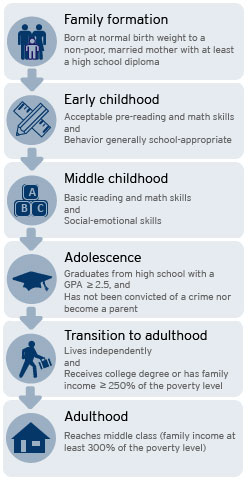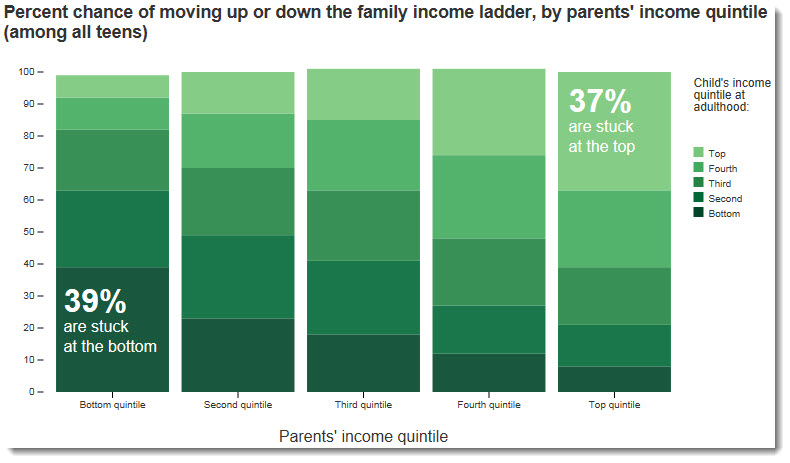President Obama’s speech on inequality and opportunity yesterday challenged the nation to focus attention on these issues and their possible connection. The Center on Children and Families at Brookings has a wealth of information that provides context, good data and commentary on these topics. Specifically:
Getting Ahead or Losing Ground: Economic Mobility in America
This report provides the basic data referenced by the president on the extent of mobility in the U.S. It also includes trends over time, and how mobility varies by country, race, gender and education. Main findings include: the U.S. has less mobility than most people think and less than other countries; blacks are less mobile than whites; education does not outweigh family background in determining who gets ahead.
Creating an Opportunity Society
In this book, co-authors Ron Haskins and Isabel Sawhill (who are co-directors of the center) argue that we need to shift the focus from fighting poverty and inequality to promoting more opportunity and contains many ideas for how to do so. Ideas from the book were also featured by Gov. Mitt Romney in the 2012 presidential debates.
Pathways to the Middle Class: Balancing Personal and Public Responsibilities
This report, based on data for a large cohort of children born primarily in the 1980s and 1990s, shows how many Americans achieve a middle class income by age 40. The main finding: the disadvantaged fall behind every step of the way, but if we could keep poorer children on track at each life stage, they would be almost as likely to be middle class by middle age as richer children.
Are We Headed Toward a Permanently Divided Society?
 In this policy brief, Sawhill argues that greater inequality likely reduces mobility, but that looking only at income is insufficient. The new class divide in America is shaped by education and family structure, not just income.
In this policy brief, Sawhill argues that greater inequality likely reduces mobility, but that looking only at income is insufficient. The new class divide in America is shaped by education and family structure, not just income.
The Myth of the Disappearing Middle Class
Haskins emphasizes in this op-ed the role of individual decision-making in opportunity and suggests the best path for young people to improve their life chances:
1) graduate from high school
2) hold a job, and
3) marry and be at least 21 years old before having children.
While the need for a national safety net remains real, making the right personal choices can have the biggest impact on increasing opportunity in the U.S.
 On the center’s blog, Social Mobility Memos, experts provide short commentary, as well as good data and analysis, on a host of issues, including how interventions at different life stages might increase the lifetime incomes of disadvantaged kids, based on Brookings’s Social Genome Model (see image on right).
On the center’s blog, Social Mobility Memos, experts provide short commentary, as well as good data and analysis, on a host of issues, including how interventions at different life stages might increase the lifetime incomes of disadvantaged kids, based on Brookings’s Social Genome Model (see image on right).
It includes, in addition, posts on skills that matter for U.S. social mobility; private education and social class; and how mobility begins in early childhood.
The Glass Floor: Education, Downward Mobility, and Opportunity Hoarding
In this paper, Reeves and Kimberly Howard reverse the focus on upward mobility to instead look at downward mobility. “Those born into more affluent families,” they argue, “may be protected from failing by a ‘glass floor,’ even if they are only modestly skilled.” They conclude that, from a mobility perspective, it would be better if college slots filled by modestly-skilled kids from the upper income levels were filled instead with motivated kids “who remain stuck at the bottom.
See also the interactive that accompanied this piece:
In this paper, Reeves and Howard explain why the parenting gap is a big factor in the opportunity gap. The chances of upward social mobility are lower for children with parents struggling to do a good job—in terms of creating a supportive and stimulating home environment. Children lucky enough to have strong parents are more likely to succeed at all the critical life stages, which means policies to help weaker parents do a better job can be investments in opportunity, and equality.
For more information about social mobility and policies for children and families, visit the Center for Children and Families on the Brookings website.


Commentary
Center on Children and Families Provides Context, Data and Commentary on Obama Opportunity Speech
December 5, 2013